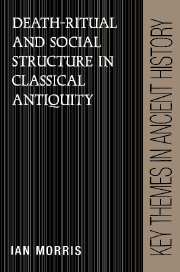Book contents
- Frontmatter
- Contents
- List of figures
- List of tables
- Preface
- Abbreviations
- 1 Map of sites in the Roman empire discussed in this book
- 2 Map of sites in Greece discussed in this book
- 1 The anthropology of a dead world
- 2 ‘Mos Romanus’: cremation and inhumation in the Roman empire
- 3 ‘Dem bones’: skeletal remains
- 4 Taking it with you: grave goods and Athenian democracy
- 5 Monuments to the dead: display and wealth in classical Greece
- 6 Famous last words: the inscribed tombstone
- 7 At the bottom of the graves: an example of analysis
- 8 Conclusion
- Bibliographical essay
- Bibliography
- Index
4 - Taking it with you: grave goods and Athenian democracy
Published online by Cambridge University Press: 02 December 2009
- Frontmatter
- Contents
- List of figures
- List of tables
- Preface
- Abbreviations
- 1 Map of sites in the Roman empire discussed in this book
- 2 Map of sites in Greece discussed in this book
- 1 The anthropology of a dead world
- 2 ‘Mos Romanus’: cremation and inhumation in the Roman empire
- 3 ‘Dem bones’: skeletal remains
- 4 Taking it with you: grave goods and Athenian democracy
- 5 Monuments to the dead: display and wealth in classical Greece
- 6 Famous last words: the inscribed tombstone
- 7 At the bottom of the graves: an example of analysis
- 8 Conclusion
- Bibliographical essay
- Bibliography
- Index
Summary
In his endless search for ‘the good’, Plato has Socrates run into Hippias of Elis. Hippias quickly finds himself boxed into a philosophical corner, and Socrates gets him to define the good as ‘to be rich, and healthy, and being honoured by the Greeks to come into old age, and after providing a fine end for his own parents, to be buried well and megaloprepōs by his own offspring’ (Plato, Hipp. Maj. 291D–E).
Like all Socrates' opponents, Hippias soon has to admit that this is muddle-headed, but Plato most likely intended it to be an attitude which many readers would share. Herodotus (1.30) had had Solon express similar sentiments, and it may have been a wellknown literary theme. Megaloprepōs is usually translated as ‘magnificently’, as seems to follow from Aristotle's discussion (EN 4.1122a 18–23a). Hippias' position would then be one which most archaeologists assume was widespread in the past. One of the commonest guesses we make is that lavish display in grave goods or monuments means a big person, surrounded in life as well as in death by throngs of admirers. But what the word really means is ‘what is appropriate for a great man’ (Hippias even says that ‘the appropriate’ (to prepon) and ‘the good’ (to kalon) are the same thing [293E]; another blunder, of course, as he works out by 294E). In the next two chapters I concentrate on the Athens of Plato (c. 427–347), give or take a generation or two, suggesting that lavish display was not always prepon for a megas.
- Type
- Chapter
- Information
- Death-Ritual and Social Structure in Classical Antiquity , pp. 103 - 127Publisher: Cambridge University PressPrint publication year: 1992
- 1
- Cited by



